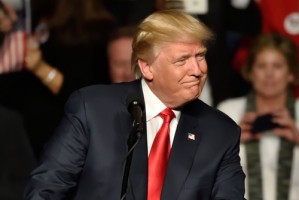Getting Ready: The ABA takes a close look at Trump administration positions

President Donald Trump. Evan El-Amin / Shutterstock, Inc.
The ABA Governmental Affairs Office has been closely monitoring positions taken by President Donald J. Trump to determine their impact on issues of concern to the association.
“The Governmental Affairs Office has been an effective advocate for advancing ABA policies in Washington, regardless of the political party in power,” says Thomas M. Susman, the GAO director. “Nonetheless, we do not underestimate the headwinds we face as we press forward in the 115th Congress on many issues of importance to the bar and the legal profession.
“Nor do we take lightly the need for strong and vigilant defensive efforts to protect against rollbacks on a number of our priority issues.”
IMMIGRATION
One area of specific concern to the ABA is immigration. The administration announced plans to immediately start building a wall on the nation’s southern border with Mexico and to initially focus on deporting illegal immigrants who have committed crimes. Other steps described on the Trump campaign website include vetting applicants to “ensure they support America’s values, institutions and people,” and temporarily suspending immigration from “regions that export terrorism and where safe vetting cannot presently be ensured.”
Trump also indicated that he would repeal numerous executive orders issued by former President Barack Obama, including ones establishing two programs supported by the ABA that address the status of undocumented people who have significant ties to the United States: Deferred Action for Childhood Arrivals and Deferred Action for Parents of Americans and Lawful Permanent Residents.
Approximately 750,000 people are participating in the DACA program, which provides temporary protected status to allow individuals brought to this country as children to go to school and work after meeting certain criteria. The DAPA program is currently blocked by an appeals court decision that the U.S. Supreme Court affirmed on a 4-4 vote.
The ABA supports enhanced border security, strongly advocates for comprehensive immigration reform that promotes legal immigration based on family reunification and employment skills, and provides new legal channels for future workers and a path to legal status for much of the undocumented population. The association also has spoken out against legislative proposals or policies that would delay or halt U.S. resettlement of Syrian, Iraqi or Muslim refugees.
CRIMINAL JUSTICE
Another ABA priority is criminal justice reform. Trump ran on a “tough on crime” agenda and said he would create a new violent-crime task force and increase spending for law enforcement and federal prosecutors. Although he has said some laws regarding nonviolent crime need to be reassessed, he has not indicated a position on bipartisan sentencing and corrections reform legislation supported by the ABA that was considered by the 114th Congress.
The legislation would have narrowed the scope of mandatory sentences to focus on the most serious drug offenders and violent criminals, allowed judicial discretion in sentencing lower-level violent offenders and expanded recidivism-reducing prison programs. Trump’s pick for attorney general, Sen. Jeff Sessions, R-Ala., has strongly opposed most of these measures.
TORT REFORM
A Republican president working with a Republican-led House and Senate also will likely initiate an aggressive revival of tort reform proposals opposed by the ABA.
During the last Congress, the House passed legislation to amend federal court rules regarding class actions and the filing of frivolous lawsuits. The ABA opposes these measures as unnecessary and unfair to victims in these cases. The association also opposes any attempt to revive legislation that would pre-empt state medical liability laws to place caps on pain and suffering awards in such cases.
Meanwhile, there will definitely be quick action to submit a Supreme Court nominee and to fill the more than 90 vacancies in the federal district and appellate courts. The ABA Standing Committee on the Federal Judiciary evaluates the professional qualifications of potential nominees for the lower federal courts before their nomination, and evaluates nominees for the Supreme Court after their nomination. It is unclear what the committee’s role will be in the Trump administration.
This report is written by the ABA Governmental Affairs Office and discusses advocacy efforts by the ABA relating to issues being addressed by Congress and the executive branch of the federal government. Rhonda McMillion is editor of ABA Washington Letter, a Governmental Affairs Office publication.
This article originally appeared in the February 2017 issue of the ABA Journal with this headline: "Getting Ready: The ABA takes a close look at Trump administration positions."



